ASTANA – Bilateral ties between Kazakhstan and Thailand are growing, with both nations showing commitment to deepen relations across trade, tourism, and culture. In an interview with The Astana Times, Chargé d’affaires at the Royal Thai Embassy in Astana Orathai Phubunlap Gunaseelan reflects on the dynamics of bilateral ties and opportunities and shares what fulfills her most in her diplomatic role in Kazakhstan.
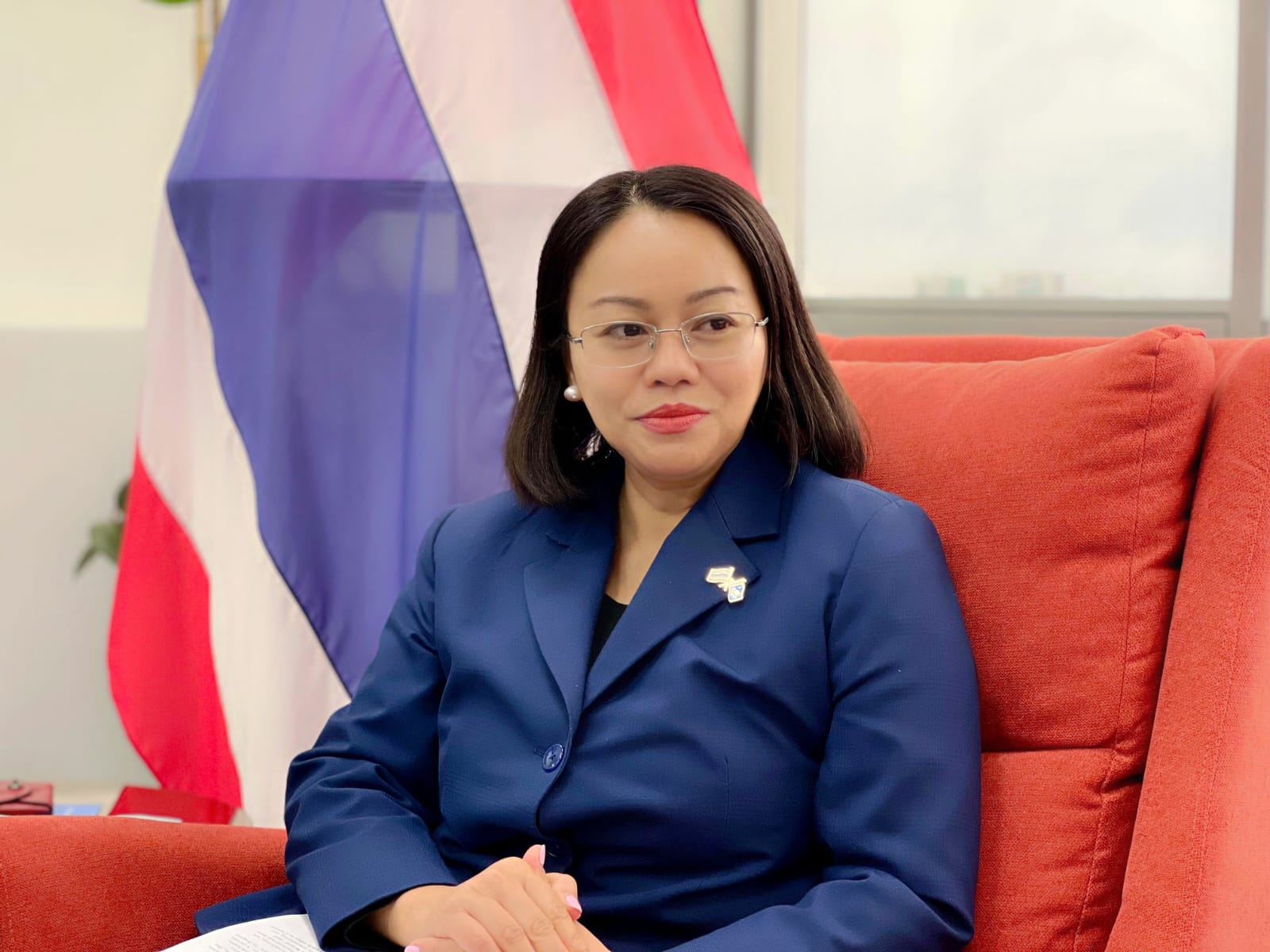
Orathai Phubunlap Gunaseelan during the interview with The Astana Times. Photo credit: Aida Dosbergenova/ The Astana Times
The two countries established diplomatic relations in July 1992. Kazakhstan’s diplomatic mission opened in Bangkok in 1997 and was reorganized into the embassy in 2012. The same year, the Royal Thai Embassy opened its doors in Astana.
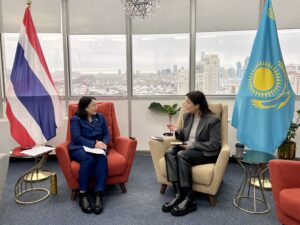
Orathai Phubunlap Gunaseelan and The Astana Times senior editor Assel Satubaldina during an interview in Astana. Photo credit: Aida Dosbergenova/ The Astana Times
Gunaseelan describes Kazakh-Thai relations as both ‘cordial’ and ‘dynamic,’ capturing the essence of the evolving partnership.
“Thailand and Kazakhstan established bilateral diplomatic relations in 1992. For more than 32 years, our two countries have enjoyed a cordial relationship, and our bilateral cooperation has covered various aspects of different dimensions. I would say that this bilateral cooperation is enhanced by the commitment and determination of our two countries’ leaderships,” said Gunaseelan, who has served in Kazakhstan for two and half years.
High-level visits
2024 witnessed key high-level visits from both sides.
In February, a delegation from the Thai Ministry of Foreign Affairs and Thai business sectors visited Kazakhstan. The delegation, led by Deputy Minister of Foreign Affairs Jakkapong Sangmanee, explored business and economic opportunities, visiting Astana and Almaty. He met with Kazakhstan’s Deputy Prime Minister and Minister of Foreign Affairs Murat Nurtleu.
In Almaty, Jakkapong Sangmanee was joined by Minister of Tourism and Sports Sudawan Wangsuphakijkosol. Gunaseelan said the delegation comprised nearly 70 members and was the highest-ever in eight years.
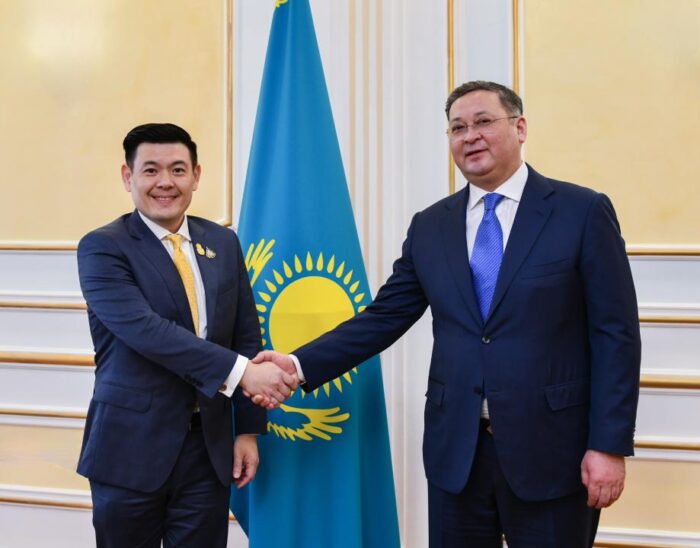
Jakkapong Sangmanee and Murat Nurtleu shake hands during their meeting in Astana in February 2024. Photo credit: Kazakh Foreign Ministry
In August, then-Thai Commerce Minister Phumtham Wechayachai led a mission to Kazakhstan to boost trade ties. The key objective of the visit was to find new markets for Thai exporters. Thai officials believe Kazakhstan could be a gateway for Thai exporters to send goods to other countries in Central Asia, including the Eurasian Economic Union (EAEU).
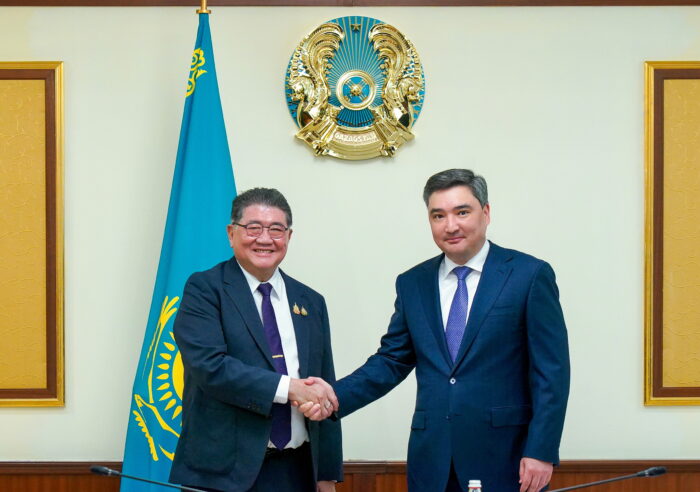
Phumtham Wechayachai and Olzhas Bektenov during their meeting in Astana in August 2024. Photo credit: primeminister.kz
Wechayachai and Kazakhstan’s Trade and Integration Minister Arman Shakkaliyev signed an agreement on economic and trade cooperation between Thailand and Kazakhstan. Discussions were held with various sectors regarding the establishment of a Thai Trade Office in Kazakhstan and strategies to enhance trade relations between the two countries.
In April, Kazakhstan’s Deputy Prime Minister – Minister of Foreign Affairs Murat Nurtleu paid an official visit to Thailand. He met with the country’s senior officials to discuss ways to strengthen the ties.
In a significant step toward strengthening bilateral ties, Nurtleu and his counterpart Parnpree Bahiddha-Nukara signed an agreement on visa exemption for national passport holders. The agreement allows citizens of both nations with passports valid for at least six months to travel, transit, and stay in the other country for up to 30 days without a visa.
The officials also oversaw the signing of a memorandum of understanding on tourism, underscoring the shared commitment to enhancing travel and cultural exchanges.
Dynamic trade, yet humble
In 2023, bilateral trade grew by 36%, reaching $367.7 million. Data from the Kazakh Bureau of National Statistics indicates trade reached $195.1 million between January and October last year, with Kazakh exports at $189.9 million.
“I would like to stress that right now, Thailand has the key policy of proactive economic diplomacy, where we want to promote trade and economic cooperation with every country around the world. Those, who are our old markets, we sustained those. Those who are considered to have potential, we want to explore,” said the Thai diplomat.
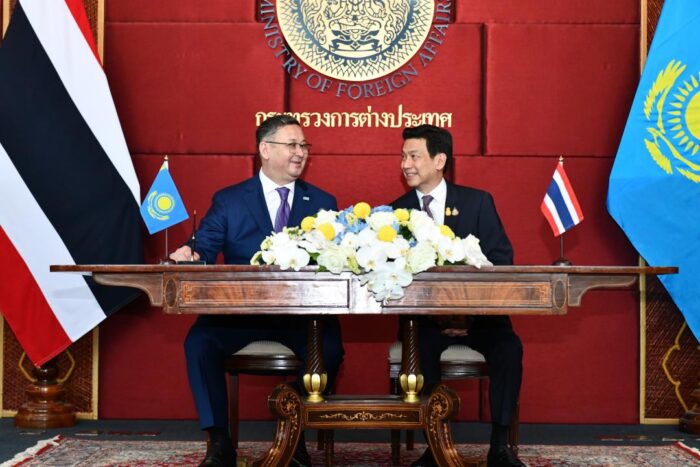
Kazakhstan’s Deputy Prime Minister – Minister of Foreign Affairs Murat Nurtleu and Parnpree Bahiddha-Nukara, Deputy Prime Minister and Minister of Foreign Affairs of Thailand, in Bangkok in April 2024. Photo credit: Kazakh Foreign Ministry
“Regarding trade and economic cooperation, we have seen the numbers growing, but I believe this number has room to expand. Because right now, we import more from Kazakhstan, and with the policy that we are advancing – proactive economic diplomacy, we hope to export our goods and products to Kazakhstan and use Kazakhstan as a hub to distribute to other countries in this region as well,” she said.
Kazakhstan sees significant potential to increase exports to Thailand. The nation targets over 100 product categories valued at more than $900 million. It is interested in exporting meat, fruits and vegetables, cereals, flour products, vegetable oils, and other agro-industrial products to Thailand.
“We aim to reach a trade volume of $500 million by 2027,” she said.
Gunaseelan emphasized Thailand’s strong potential for exporting agricultural and food products to the region, given its reputation as the “kitchen of the world.” With Kazakhstan aiming to establish itself as a regional food hub, she noted that the two countries could complement each other through agricultural trade and cooperation.
Priority areas
Gunaseelan sees tourism as having substantial potential and as one of the key areas in which she sees “dynamic and intense cooperation.”
In April 2024, Kazakhstan and Thailand signed a mutual visa exemption agreement. In July, Thailand approved a visa-free entry for visitors from 93 countries, including Kazakhstan, for up to 60 days. This applies to both business and tourism visits.
This extension aims to boost tourism by encouraging longer stays in Thailand, a nation that had a record 39 million foreign tourists in 2019, and if not for the pandemic, these numbers would have grown further.
According to the data from the Thai Ministry of Tourism and Culture, international tourist arrivals reached 35.5 million in 2024, and nearly 195,000 came from Kazakhstan, up from 173,000 in 2023.
“This number is expected to grow,” Gunaseelan added, highlighting the importance of frequent direct flights between the two countries.
Foreign policy priorities in Central Asia
Gunaseelan said Thailand has built a “friendly and cordial relationship” with all countries in Central Asia, and she is optimistic the relations will continue to solidify.
“Despite the fact that our geographical locations are so far away from each other, that should not be an obstacle if we have the determination to push forward to advance our collaboration,” she said.
She emphasized that Thailand seeks to promote cooperation not only in a bilateral format but also in a multilateral format.
“We also want to promote our cooperation in the multilateral formats, whether UN [United Nations], CICA [Conference on Interaction and Confidence Building Measures in Asia], OIC [Organisation of Islamic Cooperation], ACD [Asia Cooperation Dialogue] or SCO [Shanghai Cooperation Organization]. I would like to emphasize that Thailand is very active in the CICA framework. We are the coordinator and co-coordinator for Sustainable Development and the Development of Small and Medium Enterprises, respectively,” she said.
According to her, Central Asia is a rising star market for Thai businesses.
“But unfortunately, the Thai business sector still doesn’t know much about this region and the potential that they can offer to us, so we want to promote more trade activities,” she added.
She reaffirmed Thailand’s interest in signing a free trade agreement with the Eurasian Economic Union, a move similar to Vietnam and Singapore.
“We know that Kazakhstan supports us, and other countries also support it, but there are some countries that still have not confirmed their readiness,” she added.
Gunaseelan noted that Thai business people highlighted significant potential for growth but also pointed out key obstacles. These include language barriers and regulatory challenges, particularly in trade, economic policies, and imports, which pose significant hurdles.
Soft power
Gunaseelan highlighted the embassy’s extensive efforts to promote Thai culture and soft power in Kazakhstan. She mentioned Thailand’s national policy to enhance its global influence through 11 key soft power industries, including food, music, and Muay Thai, a traditional martial art and combat sport originating from Thailand.
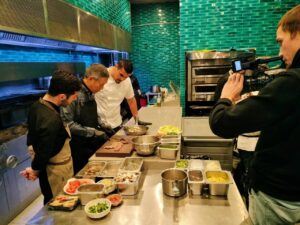
Thai cuisine cooking demonstration in Aktau in December 2023. Photo credit: astana.thaiembassy.org
The embassy sees strong interest among Kazakh citizens in Thai culture. Popular Thai dishes like Tom Yum, Pad Thai, Massaman curry, and green curry have gained significant recognition in Kazakhstan.
Muay Thai is another prominent cultural export that resonates with Kazakh audiences. The embassy organized friendly Muay Thai matches between Thai and Kazakh boxers.
She expressed optimism about future projects, building on the positive feedback from past initiatives. “We hope that we will do more this year,” she added.

Muaythai championship in Astana in 2023. Photo credit: astana.thaiembassy.org
Parallels between life philosophies
Thailand and Kazakhstan share more than a growing partnership in trade and tourism. Gunaseelan said both countries derive their names from concepts of freedom—Thailand, meaning ‘land of the free,’ and Kazakhstan, from the word Kazakh, signifying ‘free’ or ‘wanderer.’
According to her, hospitality is another striking similarity, deeply ingrained in the cultures of both countries. Kazakhstan’s concept of ‘konak asy’—the practice of generously hosting guests with an abundance of food and care—echoes Thailand’s global reputation as the ‘land of smiles.’
In both nations, guests are treated with warmth, kindness, and an innate desire to ensure their comfort.
“Just like in Thailand, people are ready to help. (…) Everywhere you go, you see the smile on the face,” she added.
Beyond their hospitality, both nations embrace a cultural philosophy of resilience and positivity in the face of challenges. In Thailand, the phrase – sabai sabai – encapsulates the idea of taking life in stride and remaining relaxed and optimistic even during difficult times.
“In Kazakhstan, I think you have the word ‘sabyr,’ which means the ability to endure challenges, obstacles, and difficulties with calmness, tolerance and patience,” said Gunaseelan.
Fulfilling and rewarding experience
Reflecting on her two-and-a-half years in Kazakhstan, she said it has been a deeply fulfilling and rewarding experience. Kazakhstan is her second posting after Moscow.
In her role, she has overseen a broad spectrum of initiatives to enhance bilateral relations, not only with Kazakhstan but also with the Kyrgyz Republic and Tajikistan, which the embassy covers.
Her time in Kazakhstan has also been enriched by extensive travel across the country.
“I have a lot of chances to travel in Kazakhstan to see beautiful sceneries and different natures in different regions, whether in Aktau, Shymkent, Karagandy and Almaty. Because of traveling, I get to meet a lot of interesting people from different circles, high ranking officials, academic people, business people, or even ordinary people,” said the diplomat.
She noted that one of the most remarkable traits she observed in Kazakhstan is the resilience and adaptability of its people.
“For example, in Astana, the weather is so harsh, but people just live their lives normally. That makes me think about your high level of tolerance and patience with the weather. But not only that, I see that you have a lot of ethnicities, people from different nationalities, and you live with each other in a multicultural society, and it shows the high level of tolerance and patience in your society,” she said.
